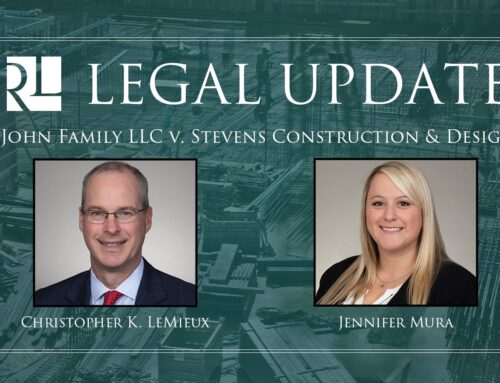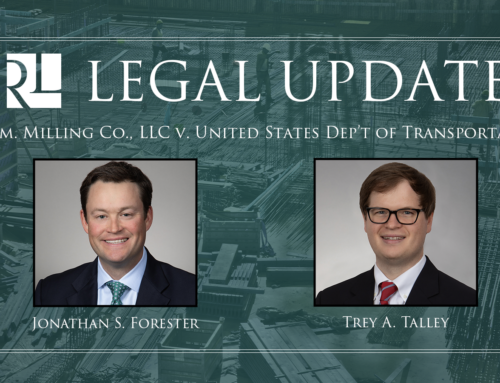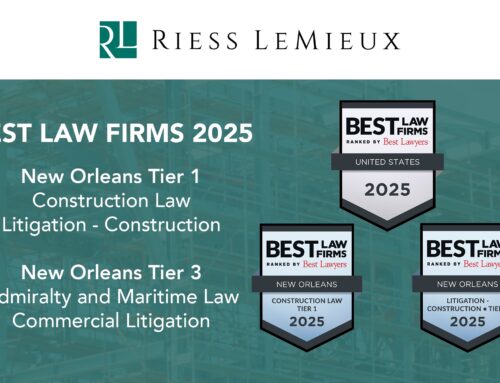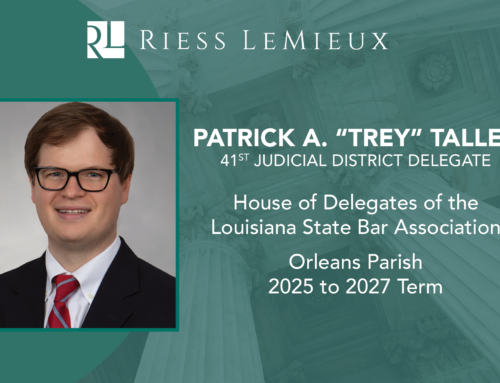
The passage of House Bill No. 203 represents the most extensive overhaul of the Louisiana Private Works Act (LPWA) in nearly 40 years. The legislature enacted significant amendments that change, among other things: (a) filing requirements for general contractors and owners, (b) notices required of claimants to preserve a claim or privilege, (c) when liens may be timely recorded, (d) liability of payment bond sureties, (e) ranking of statutory privileges, (f) cancellation or extinguishment of liens, and (g) delivery of documents and notices by electronic means.
Particularly important is a change to La. R.S. § 9:4822, which governs deadlines to record liens. The change in terminology from “within” to “no later than” under this provision makes clear that claimants are not required to wait until the commencement of the lien-filing period (usually substantial completion) to file a lien. This revision distinguishes the LPWA from its companion Public Works Statute, which has been interpreted by some courts to render liens filed before the commencement of the lien-filing period as premature and invalid. See, e.g., Gootee Constr., Inc. v. Dale N. Atkins, 2015-0376 (La. App. 4 Cir. 11/4/15); 178 So.3d 629, reh’g denied (La. App. 4 Cir. 12/1/15).
In addition to substantial revisions to the LPWA and related Civil Code Articles, the legislation includes in-depth comments that clarify how the law is intended to be applied; in many instances, the comments approve or reject certain judicial opinions to clear up ambiguity or conflict between the appellate courts. Nearly all changes become effective on January 1, 2020, while a handful of the amendments are retroactive.
Please check back for a more detailed analysis on the widespread changes to the LPWA and their considerable impacts on the construction industry.
2. Use of A+B Bidding Method for Public Works – La. R.S. § 38:2211.2.
 The new law allows local governments to use the A+B bidding method. Also called cost-plus-time bidding, A+B bidding includes two components to determine a low bid—the traditional bid amount or cost to perform the work (“A”) plus the number of calendar days required to complete the project (“B”). The A+B method makes the public-bidding process more flexible by permitting the public owner to factor construction time into the determination of the lowest responsive bid. The new law will allow any local governmental subdivision or political subdivision to use the A+B method if the bidding documents specify that the low bid will be determined by the lowest combination of cost plus construction time. The bidding documents must also specify the value and use of construction time in determining the low bid. The new law also creates a pilot program to gauge the effectiveness of the A+B bidding method for fifteen projects approved by the House and Senate transportation, highways, and public works committees. The new law will become effective August 1, 2019.
The new law allows local governments to use the A+B bidding method. Also called cost-plus-time bidding, A+B bidding includes two components to determine a low bid—the traditional bid amount or cost to perform the work (“A”) plus the number of calendar days required to complete the project (“B”). The A+B method makes the public-bidding process more flexible by permitting the public owner to factor construction time into the determination of the lowest responsive bid. The new law will allow any local governmental subdivision or political subdivision to use the A+B method if the bidding documents specify that the low bid will be determined by the lowest combination of cost plus construction time. The bidding documents must also specify the value and use of construction time in determining the low bid. The new law also creates a pilot program to gauge the effectiveness of the A+B bidding method for fifteen projects approved by the House and Senate transportation, highways, and public works committees. The new law will become effective August 1, 2019.
3. Oil Spill Settlement Funds Directed to Infrastructure Projects – La. R.S. §§ 39:91 and 1367
 The new law appropriates nearly $700 million in settlement funds from the BP Oil Spill litigation (In re: Deepwater Horizon) to transportation projects across the state. Each year the state receives $53 million from the Deepwater Horizon oil spill settlement; previously, those funds were allocated to the state’s rainy-day fund, the Medicaid Trust Fund, and the Health Trust Fund. The new law reroutes the annual $53 million payout to the Construction Subfund of the Transportation Trust Fund, with all the funds going exclusively to roadway construction and rehabilitation projects. The allocation includes $250 million for Interstate 49, $125 million for the LA 415 Bridge at the Intracoastal Canal, and $40 million for replacement and rehabilitation of highway bridges throughout the state. The law became effective June 25, 2019.
The new law appropriates nearly $700 million in settlement funds from the BP Oil Spill litigation (In re: Deepwater Horizon) to transportation projects across the state. Each year the state receives $53 million from the Deepwater Horizon oil spill settlement; previously, those funds were allocated to the state’s rainy-day fund, the Medicaid Trust Fund, and the Health Trust Fund. The new law reroutes the annual $53 million payout to the Construction Subfund of the Transportation Trust Fund, with all the funds going exclusively to roadway construction and rehabilitation projects. The allocation includes $250 million for Interstate 49, $125 million for the LA 415 Bridge at the Intracoastal Canal, and $40 million for replacement and rehabilitation of highway bridges throughout the state. The law became effective June 25, 2019.
4. Amendments to Contractor Licensing Statute – La. R.S. § 37:2150.1, et seq.
 The law governing the Louisiana State Licensing Board for Contractors (LSLBC) has been amended in several important ways, including to streamline the process for licensure and to allow the LSLBC to impose substantial new penalties for violations of the licensure law. Administrative changes include simplification of the appointment process, new requirements regarding the location of board meetings, and making LSLBC meetings subject to the Open Meetings Law. The new law also strengthens the board’s authority to penalize noncompliant contractors. It allows the LSLBC to revoke or suspend a contractor’s license for failure to notify the board of any change in corporate name or address. Violations of the state licensure law now carry a fine of up to 10% of the value of the contract (in addition to court costs and attorney’s fees), a consequential increase from the $1,000 limit under the prior law. Language throughout the statute has been modernized and clarified, but procedures for licensure are no more onerous for contractors than under the prior law. The amendment became effective June 11, 2019.
The law governing the Louisiana State Licensing Board for Contractors (LSLBC) has been amended in several important ways, including to streamline the process for licensure and to allow the LSLBC to impose substantial new penalties for violations of the licensure law. Administrative changes include simplification of the appointment process, new requirements regarding the location of board meetings, and making LSLBC meetings subject to the Open Meetings Law. The new law also strengthens the board’s authority to penalize noncompliant contractors. It allows the LSLBC to revoke or suspend a contractor’s license for failure to notify the board of any change in corporate name or address. Violations of the state licensure law now carry a fine of up to 10% of the value of the contract (in addition to court costs and attorney’s fees), a consequential increase from the $1,000 limit under the prior law. Language throughout the statute has been modernized and clarified, but procedures for licensure are no more onerous for contractors than under the prior law. The amendment became effective June 11, 2019.
5. Revisions to Public-Private Partnership Statute – La. R.S. §§ 48:250.4 and 2084.6
 The amendments to the Public-Private Partnership (P3) statute will allow the inclusion of a provision in a comprehensive agreement between a public authority and private entity whereby the public authority can retain liability for damages arising from personal injury or property damage to third parties that occur on state-owned highways or transportation facilities. The previous law did not contemplate the authority’s ability to assume third-party liability. By granting public agencies the right to assume liability on P3 projects, public-private partnerships should become more attractive to contractors and open the door for more highway and transportation projects to be performed via the P3 project delivery method. The new law became effective June 11, 2019.
The amendments to the Public-Private Partnership (P3) statute will allow the inclusion of a provision in a comprehensive agreement between a public authority and private entity whereby the public authority can retain liability for damages arising from personal injury or property damage to third parties that occur on state-owned highways or transportation facilities. The previous law did not contemplate the authority’s ability to assume third-party liability. By granting public agencies the right to assume liability on P3 projects, public-private partnerships should become more attractive to contractors and open the door for more highway and transportation projects to be performed via the P3 project delivery method. The new law became effective June 11, 2019.
6. Veterans First Business Initiative – La. R.S. § 51:3201, et seq.
 The new law creates the Veterans First Business Initiative to recognize and reward members of the armed forces for their service and honor their sacrifices for the country. The statute authorizes the formation of a new database of veteran-owned businesses to highlight and promote them to the general public and to allow businesses and customers to easily identify and support veterans. Additionally, the law will establish a service to connect veterans seeking employment with veteran-owned businesses, ensuring service men and women better opportunities to re-enter the civilian workforce. A business qualifies as “veteran owned” under the law if 51% of the business is owned by a veteran or the spouse of a Gold Star serviceperson. Businesses that meet the criteria will be certified as veteran-owned and be granted the right to display an insignia on its storefront or promotional materials. The law will become effective August 1, 2019.
The new law creates the Veterans First Business Initiative to recognize and reward members of the armed forces for their service and honor their sacrifices for the country. The statute authorizes the formation of a new database of veteran-owned businesses to highlight and promote them to the general public and to allow businesses and customers to easily identify and support veterans. Additionally, the law will establish a service to connect veterans seeking employment with veteran-owned businesses, ensuring service men and women better opportunities to re-enter the civilian workforce. A business qualifies as “veteran owned” under the law if 51% of the business is owned by a veteran or the spouse of a Gold Star serviceperson. Businesses that meet the criteria will be certified as veteran-owned and be granted the right to display an insignia on its storefront or promotional materials. The law will become effective August 1, 2019.
7. Amendments to Underground Excavation/Demolition Law – La. R.S. §§ 40:1749.13, 1749.14, and 1749.22

Revisions to the Underground Utilities and Facilities Damage Prevention Law will affect the underground utility excavation process when the work site is on or near water. The existing law requires contractors to wait at least forty-eight hours after giving notice before commencing the excavation or demolition. The amended law provides a process when the party seeking to excavate or demolish cannot mutually agree with the operator of the utility on an extended delay period. If the proposed activity could impact a pipeline on or in water, the utility operator can request a delay in the mark-by time to allow for the accurate marking of the pipeline. The Commissioner of Conservation is granted the authority to extend the mark-by time for as long as required to accurately mark the location of the facility or utility before any excavation or demolition occurs. The amendment will become effective August 1, 2019.
8. Sales and Use Taxes on Raw Materials for Roadways – La. R.S. § 47:337.12.1
 The new law provides for the determination of where taxes for sales and use of materials converted into roadways are due. Under the new statute, sales tax is due in the taxing jurisdiction of the dealer when title, possession, or both are transferred to the contractor at the dealer’s location. Alternatively, when the materials are delivered to the contractor, sales tax is due in the taxing jurisdiction where the roadway under construction is located. For use taxes on materials, when the materials are converted into asphalt in a different taxing jurisdiction from where they were delivered, the use tax will be due in the taxing jurisdiction where the roadway is located. The use tax is waived when the materials are sold and converted into roadways in the same taxing jurisdiction. The law became effective June 11, 2019.
The new law provides for the determination of where taxes for sales and use of materials converted into roadways are due. Under the new statute, sales tax is due in the taxing jurisdiction of the dealer when title, possession, or both are transferred to the contractor at the dealer’s location. Alternatively, when the materials are delivered to the contractor, sales tax is due in the taxing jurisdiction where the roadway under construction is located. For use taxes on materials, when the materials are converted into asphalt in a different taxing jurisdiction from where they were delivered, the use tax will be due in the taxing jurisdiction where the roadway is located. The use tax is waived when the materials are sold and converted into roadways in the same taxing jurisdiction. The law became effective June 11, 2019.
9. Time Limitations for Disciplinary Proceedings Against Architects, Engineers, and Surveyors – La. R.S. 37:21, et seq.
 The amendment abolishes the existing time limitations on disciplinary proceedings for architects, professional engineers, and land surveyors. The notification requirements in the existing law requires the applicable board or commission to provide notice in writing to the subject of the disciplinary complaint within six months of the filing of the complaint and to hold the hearing within six months of the notice of hearing. The failure to do either bars the board or commission from taking further action. Importantly, the amendment to the statute provides that these time limitations do not apply to the State Board of Architectural Examiners and the Louisiana Professional Engineering and Land Surveying Board. The amendment means disciplinary proceedings against architects, professional engineers, and land surveyors may be extended indefinitely.
The amendment abolishes the existing time limitations on disciplinary proceedings for architects, professional engineers, and land surveyors. The notification requirements in the existing law requires the applicable board or commission to provide notice in writing to the subject of the disciplinary complaint within six months of the filing of the complaint and to hold the hearing within six months of the notice of hearing. The failure to do either bars the board or commission from taking further action. Importantly, the amendment to the statute provides that these time limitations do not apply to the State Board of Architectural Examiners and the Louisiana Professional Engineering and Land Surveying Board. The amendment means disciplinary proceedings against architects, professional engineers, and land surveyors may be extended indefinitely.
10. Increase in Public Works Contract Limit in St. Charles Parish – La. R.S. § 38:2212
 The amendment to the Public Works Act provides that contracts for drainage projects in St. Charles Parish in excess of $250,000 will require public bidding when the work is to be done by the regular maintenance employees of St. Charles Parish. On February 1st of each year beginning in 2021, the contract limit will annually be adjusted and published by the Division of Administration, Office of Facility Planning and Control. The amendment will become effective August 1, 2019.
The amendment to the Public Works Act provides that contracts for drainage projects in St. Charles Parish in excess of $250,000 will require public bidding when the work is to be done by the regular maintenance employees of St. Charles Parish. On February 1st of each year beginning in 2021, the contract limit will annually be adjusted and published by the Division of Administration, Office of Facility Planning and Control. The amendment will become effective August 1, 2019.



